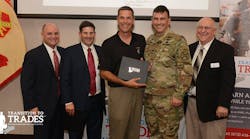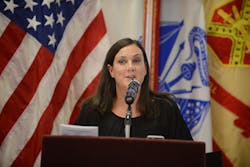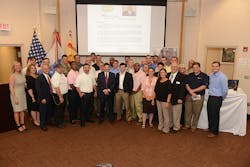Latest from Training
Sponsored
NASHVILLE — It’s the very least we can do as an industry in exchange for sacrifices made for our country. Providing a seamless transition to the trade workforce from the military is a top priority for Daphne Frontz, senior program manager, Transition to Trades, and corporate recruiter for Hiller Plumbing, Heating, Cooling & Electrical, Nashville.
What started in July of 2016, Transition to Trades, an exchange program of sorts with nearby Army Post Fort Campbell, seeks to “enlist” outgoing service personnel into the trades — a vehicle to allow service men and women to assimilate back into the workforce, and take care of their families.
“Spending 10 years in the infantry doesn’t necessarily transfer over very well to civilian life. Regardless, these men and women still have mortgages, kids, spouses, bills, etc., to take care of,” said Frontz.
As is the case with many contractors, it is hard to find someone who wants to work and can pass a drug and background screening. “We thought if we can find the core values of an employee — dedication, respect, loyalty, integrity, etc. — then we can train them to do anything. We realized that we had one of the largest Army bases about an hour away, Fort Campbell, Kentucky, and what better place to look for those core values,” said Frontz.
“Transitional periods can be hard, especially when it means leaving a familiar career, like in the Army, to start something totally different,” said Jimmy Hiller, owner, Hiller Plumbing, Heating, Cooling & Electrical. “This program allows transitioning soldiers to learn skill sets and prepare for their new futures while they are still in a stable, familiar environment and helps them with job placement after their completion.”
“Soldiers have the respect, team mentality, honor and work ethic that makes them ideal employees our company, and thanks to Transition to Trades, they are already equipped with the training and skill sets required to succeed too,” continued Hiller.
Transition to Trades is giving these men and women an opportunity that otherwise they wouldn’t have had. “I’ve seen grown men cry with worry on what they are going to do post-Army. You realize along the way that you are changing a life,” said Frontz.
Starting last August, the Transition program is taking recruits from Army bases across the country, thanks, in part, to a recently passed directive by the Army, which allows soldiers to go to a post other than their active duty base to take a Career Skills Program (CSP). In fact, the program has a soldier coming from Fort Carson, Colorado, in March, and it has had a few participate from Fort Bragg, Fort Bliss and Fort Stewart.
“However, the issue with soldiers coming from other bases is that to participate in the CSPs at Fort Campbell, they have to have their own housing; Fort Campbell hasn’t opened up the base for temporary transfers,” said Frontz.
A soldier coming from Colorado for a month has to pay out of pocket for a hotel. Frontz is looking at a way to form a partnership with a hotel chain to get discounted rates, or a donation.
And, ultimately, “We are working getting the program out to the other branches of the military in order to allow their transitioning members to participate; it is a work in progress,” she said.
The great thing about these courses, said Frontz, is the short length especially for someone with not a lot of time, or looking to learn a new skill for employment quickly.
Inside the program
Hiller is fortunate to have its own training school — Total Tech, which offers attendees a premier learning experience by creating a proper learning environment. Total Tech had the privilege of partnering with Hiller in August of 2013. The partnership allowed founder Don Miller and his wife, Shawna, to expand the business into other trades. Total Tech began offering their Plumbing Fundamentals and Electrical Fundamentals courses in early 2015. While Total Tech is partnered with Hiller PHCE, and they are both at the same location, Total Tech still operates as a separate entity and continues to accept outside students, which include the novice, as well as the experienced technician.
If all the classes are taken, the program offers a total of 340 clock hours of training. Each trade is 100 hours for plumbing, HVAC analysis and electrical, or 30 days. And the HVAC replacement course is 40 hours or one week. The great thing about these courses, said Frontz, is the short length especially for someone with not a lot of time, or looking to learn a new skill for employment quickly. The soldiers can take one or all of the classes.
“Whatever they have time for and they can get approval for. The more training, the more marketable they are for employment,” she noted.
Take it from one of the attendees of the program. “Over the past three months, the knowledgeable instructors taught us more than I thought I would ever know,” said SFC Aaron Cole. “They have taught us how to diagnose, repair, and service a heating and air unit. They have taught us how to install, diagnose and repair plumbing systems, install water heaters, and how to repair a leaking faucet. Most importantly they taught us how to do all of these things while ensuring that the customer is the number one priority.” SFC Cole joined the Army in July 2000 from Vancouver, Washington, served in Iraq and Afghanistan, and has received multiple awards, including the Bronze Star.
As for some other benefits? The program offers a ride-along as hands-on, real-life experience.
“We put the soldier in a truck with one of our techs for however time allotted by their command,” said Frontz. “This gives them more leverage when it comes to interviewing, especially outside of Hiller.”
Transition to Trades also has partnered with Workforce Essentials in Tennessee. Funded through a grant from the state, any soldier that registers with Workforce will get more than $1,000 in tools for all three trades free of charge by going through the program. The soldier has to stay in state for employment to receive this benefit.
And, through the apprenticeship program Frontz set up through the Veteran’s Affair’s VA, and applied to a soldier that works for Hiller, he or she can use their housing allowance while going through the apprenticeship to help offset the income they lost in the Army and training as a tech for Hiller. “It is $1,900 a month so it definitely helps out.”
Moving forward
Recently, Tennessee Governor Bill Haslam congratulated the program’s dedication to continued success for veterans. Additionally, a representative from U.S. Congresswoman Marsha Blackburn’s office awarded Transition to Trades members congressional record certificates to commend the program’s dedication to serving veterans.
Frontz has been pleasantly surprised by the success of the program.
“We had no idea this program was going to develop the way it has,” she said. “To date, we have graduated 216 soldiers. We have 95 currently in class or scheduled for future classes throughout 2018. Of the graduated soldiers, 15 have reenlisted, 12 are continuing education and 177 have jobs.”
With its partnership with Praxis-S10, Transition to Trades has access to more than 200 companies across the United States. Praxis S-10 is a growing Success College for Contractors, founded by HVAC industry icons Jim Abrams and Terry Nicholson, in conjunction with Jimmy Hiller.
Even with the help and reach of Praxis S-10, the recruitment program isn’t without its share of hiccups. “The number one issue is the lack of response back to cold calls or emails that I send out to companies across the country. I think the biggest misconception is the length of the program, which, for each trade, is 30 days. To employers, that sounds extremely short considering technical schools are 18 months or more. The difference is that we are 80% lab work and try to teach in 30 days what those other schools teach in 1.5 years,” said Frontz. “We are looking to expand on the school and the program to assist more veterans and our fellow trades.”
Upon graduation, attendees of the program are guaranteed an interview with a respected service contractor in his/her state. “We guarantee everyone an interview, and I will go above and beyond to try to ensure every soldier ends up with a job. They trust me enough to go through this program because they trust that I am going to help them. I refuse to let them down,” declared Frontz.
Bottom line, we need more employers on board, she said, to assist in getting these men and women employment. “At some point, we need to expand on the school and/or add another one in order to take more students.”
In any event, this is a great way to generate the next generation of technicians in the trades. With so many in the field retiring, coupled with the construction boom across the United States, says Frontz, it’s a sure way to have trained employees.
“Everyone needs employees for these trades across the country. So why not partner and hire these soldiers?” she asked. “You get the soft skills they learn in the Army, we teach the hard skills, and the companies get the loyal, dedicated, honorable employee they need. And at the same time, we, as a trade industry, are giving back to those that have protected us for years.”




